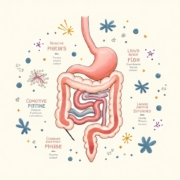How Bioactive Peptides Influence Gut Health and Digestion: A Scientific Breakdown
Bioactive peptides, short sequences of amino acids derived from larger proteins, are increasingly recognized for their role in modulating digestive health and gut microbiota activity. These peptides are formed naturally during enzymatic hydrolysis in digestion or through fermentation and controlled processing of dietary proteins. Their biological activity extends far beyond basic nutrition, impacting immune response, intestinal permeability, enzyme regulation, microbial composition, and inflammatory control. The implications for gastrointestinal health are profound, particularly in addressing metabolic disorders, leaky gut, and microbiota dysbiosis.
For researchers looking to conduct controlled studies or clinical testing, sourcing peptides for sale from regulated suppliers ensures compound consistency. When preparing for trials, tools like a peptide dosage calculator are invaluable for accurate dilution and administration across sample groups.
Bioactive Peptides and the Gut Microbiome: A Symbiotic Relationship
The gastrointestinal tract houses over 100 trillion microbes that play a critical role in maintaining systemic health. Bioactive peptides influence this microbiota by acting as signaling molecules that either suppress or stimulate specific bacterial growth. Peptides derived from milk proteins, such as casein and whey, have demonstrated prebiotic-like effects, supporting the proliferation of Lactobacillus and Bifidobacterium strains. These microbes, in turn, enhance short-chain fatty acid (SCFA) production, improving colonocyte health and modulating immune responses.
Moreover, peptides such as lactotripeptides and soy-derived sequences have been found to exhibit antimicrobial properties against pathogenic species like E. coli and Salmonella, helping maintain a favorable microbial balance. The interaction between peptides and the microbiota is bidirectional: gut bacteria can also hydrolyze dietary peptides into new bioactive forms with unique physiological roles.
Researchers comparing peptides vs SARMs often highlight peptides’ compatibility with gut biology due to their endogenous nature and enzymatic biodegradability, which minimizes systemic burden and toxicity in long-term studies.
Peptides and Intestinal Barrier Function
A well-regulated intestinal barrier is essential for protecting against endotoxins and systemic inflammation. Bioactive peptides reinforce this barrier through modulation of tight junction proteins such as occludin, claudin, and zonulin. In inflammatory conditions, these junctions become compromised, allowing translocation of pathogens and toxins a phenomenon known as “leaky gut.”
Peptides derived from plant proteins (e.g., rice, soy, pea) and marine sources (e.g., fish collagen) have been shown to enhance the expression of mucins and improve epithelial integrity. In Caco-2 cell models, certain di- and tripeptides increase trans-epithelial electrical resistance (TEER), indicating enhanced tight junction function. This regulatory effect reduces gut permeability and helps normalize cytokine production, which is vital for patients suffering from inflammatory bowel conditions like Crohn’s disease or ulcerative colitis.
Scientists seeking to get high-quality peptides online for intestinal permeability studies often prefer enzymatically isolated peptides, which have higher bioavailability and stability through the digestive tract.
Anti-Inflammatory and Antioxidant Effects in the GI Tract
Inflammation is a root cause of many gastrointestinal disorders, including irritable bowel syndrome (IBS) and gastric ulcers. Bioactive peptides can exert potent anti-inflammatory effects by downregulating pro-inflammatory markers like TNF-α, IL-6, and NF-κB while upregulating antioxidant enzymes such as glutathione peroxidase and catalase.
Peptides containing hydrophobic amino acids like leucine, isoleucine, and valine have demonstrated strong free radical scavenging activity in oxidative stress models. These peptides act by binding metal ions and inhibiting lipid peroxidation, thereby protecting intestinal tissues from oxidative damage.
In rodent studies, peptide-enriched diets resulted in decreased intestinal inflammation markers and improved mucosal regeneration. Such properties are being investigated in clinical models aimed at reversing NSAID-induced gastric damage and restoring gut balance in autoimmune conditions.
Peptides and Digestive Enzyme Regulation
The regulatory role of peptides extends to enzymatic activity in the gut. Some peptides have been found to inhibit enzymes like angiotensin-converting enzyme (ACE) and dipeptidyl peptidase-IV (DPP-IV), both of which are implicated in gastrointestinal signaling and metabolic disorders. ACE-inhibitory peptides have shown benefits in blood pressure regulation while concurrently improving mesenteric blood flow and nutrient absorption in the gut.
Additionally, bioactive peptides can stimulate the secretion of gastric hormones such as cholecystokinin (CCK) and glucagon-like peptide-1 (GLP-1), promoting better digestion and glycemic control. These hormones influence gastric emptying, pancreatic enzyme release, and insulin sensitivity all crucial factors for metabolic stability and digestive efficiency.
Conclusion: The Future of Peptide Research in Digestive Health
Bioactive peptides represent a new frontier in digestive health research, offering multifaceted benefits that range from microbiota regulation to gut barrier enhancement and inflammatory control. Their versatility, biocompatibility, and specificity make them valuable tools in the development of therapeutic strategies for chronic gut disorders and systemic inflammatory conditions.
Ongoing studies are focused on identifying novel peptide sequences with targeted actions, optimizing delivery mechanisms, and validating human clinical outcomes. As peptide science advances, the integration of bioactive peptides into gut health protocols is poised to transform the way gastrointestinal health is studied and supported.

